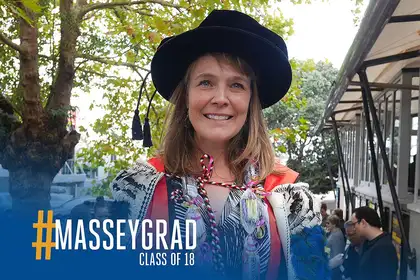
Dr Wendy Holley-Boen.
New research from Massey University has identified strategies to help specialist teachers lift the wellbeing and achievement of learners, whilst maintaining their own wellbeing and fulfilment amid personal and professional challenges.
For her PhD research Dr Wendy Holley-Boen, who lectures at Massey’s Institute of Education, followed 14 practising specialist teachers over their two-year study in the Specialist Teaching Programme – a boutique postgraduate programme jointly offered by Massey University and the University of Canterbury.
The programme aims to advance inclusive education by preparing educators transitioning to specialist teaching roles in areas such as autism spectrum disorder, blind and low vision, learning and behaviour, gifted and talented, deaf and hard of hearing, early intervention, and complex educational needs.
Dr Holley-Boen, who graduated yesterday, has developed a new framework to explore what fulfilment and wellbeing mean for specialist teachers, and to accommodate the complex demands and issues they face.
Through individual interviews and group discussions, study participants explored their changing perspectives on identity, practice and wellbeing.
What resulted from these conversations is what Dr Holley-Boen calls ‘practising fiercely’ - a framework for finding fulfilment through a strong personal and professional stance that is enacted in one’s practice. “It’s about living our values, giving and getting support across settings and having a long-term, intentional approach to maintaining our stamina,” she says.
For example, a specialist teacher might advocate to spend more time building relationships with families because of their deep commitment to partnership, even if this is at odds with official job requirements to meet “efficiency” goals.
“The difficult conversation with a line manager, and the additional work that teacher takes on, might seem contrary to the ways some people imagine protecting their wellbeing. But working in ways that fit with our individual and collective values actually supports personal and professional fulfilment,” she says.
“You might come home tired that day, but you can say, ‘I did a good job today. I fought the good fight and practised in ways that were true to me and the people I’m supporting.’”
Findings from the study informed the development of a framework for the fulfilment of teachers, but hopefully with relevance to other groups as well, she adds. The framework identifies and builds on the connections across identity, practice and wellbeing by incorporating the value of such things as knowing oneself; conceptualising practice as relational, ecological, contextualised and challenging; and embracing lifelong learning.
Managing rewards and tensions of specialist teaching
“It’s a great time to be a teacher and it’s a hard time to be a teacher – this is also true for specialist teachers who are working one layer out from teachers, whānau and other professionals to support all learners,” Dr Holley-Boen says.
“Being an educator can be a deeply rewarding profession, but it can pose threats to personal wellbeing. As with so many of us, the teachers in this research worked to integrate further study with already complex lives involving the care of young children, elderly parents, and a range of other enablers and barriers.
“I wanted to see if there were ways to lift wellbeing by tackling some of the deeper issues like finding meaning in our work, creating networks of support and crafting our jobs to align with our values” Dr Holley-Boen says.
“This research is timely as it investigates an emerging group of professionals, specialist teachers in Aotearoa New Zealand, who integrate postgraduate study with new professional roles and other facets of their lives.”
A registered educational psychologist, originally from California, Dr Holley-Boen came to Massey in 2012 after working as an educational psychologist at the Ministry of Education here, and overseas.
“I came to Massey specifically to work on this programme because it’s the only one of its kind, and I came to New Zealand because of the promise of inclusive education here. I want to learn from and contribute to the sector any way I can.
“I also wanted to do my PhD here because I knew I’d be able to integrate my study with my own practice, have the freedom to make it my own, and be supported by my amazing team who would make it possible for me to do all I needed to do.”
The Specialist Teaching programme comprises the Postgraduate Certificate, Postgraduate Diploma, and Master’s degree.